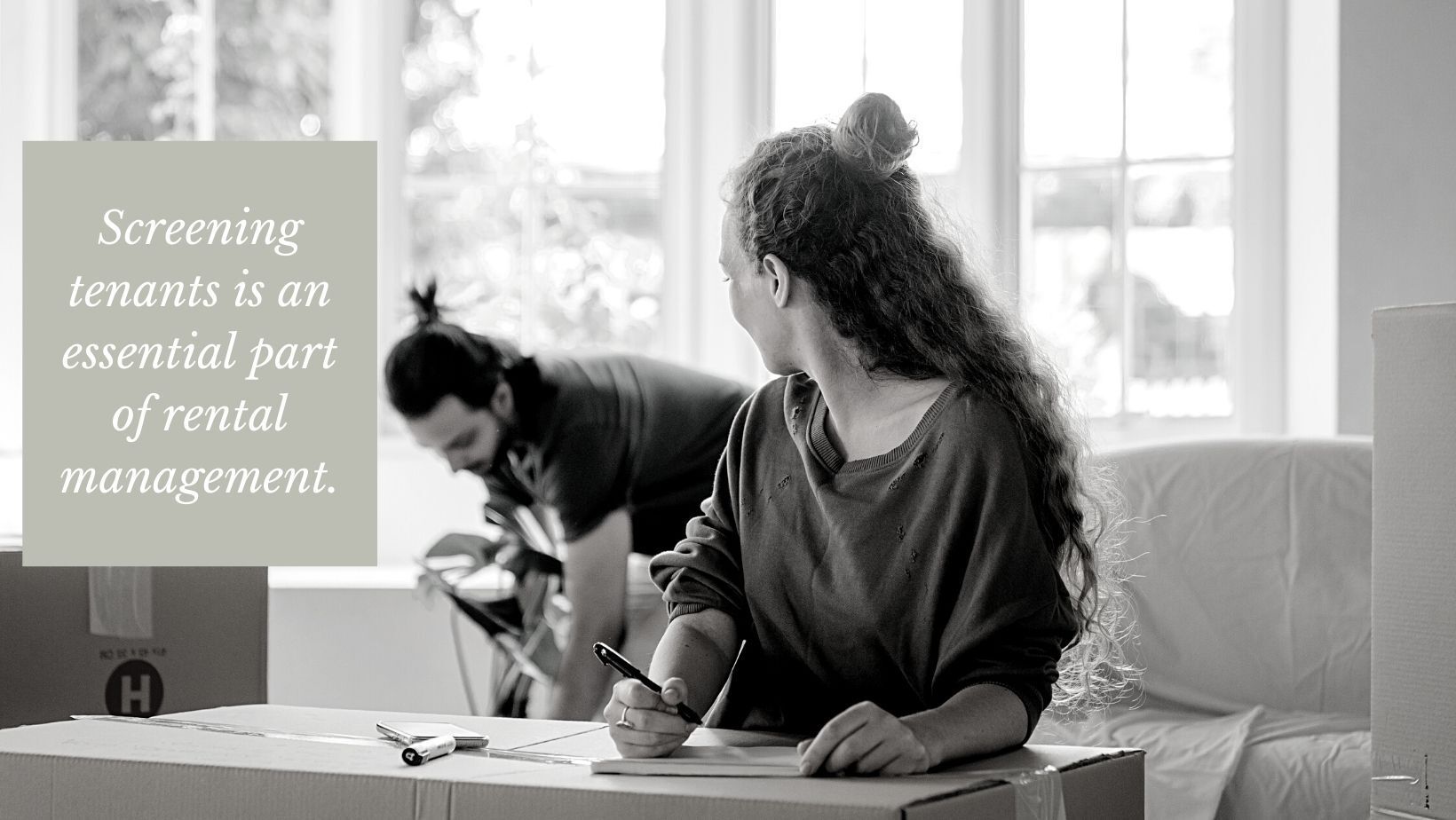Can a Landlord Do a Criminal Background Check?

Property owners have a duty to protect their tenants, the property, and the community. Part of ensuring safety and security is through conducting tenant background checks. Not only is a landlord allowed to do a criminal background check of prospective tenants, it is a necessary part of managing rental property.
According to the U.S. Department of Housing and Urban Development, nearly ⅓ of the country’s adult population has some type of blemish on their record. And while everyone deserves a roof over their head, landlords have the right to deny renting to someone who may pose a threat, as long as their decision is fair and follows the law.
The Risks of Not Screening Tenants
Screening tenants is an essential part of rental management. A credit report and employment verification will illustrate their ability to pay the rent. Talking to former landlords can give insight into if they follow rules and keep their home clean. A criminal background check will tell the story of any illegal or dangerous activities in the person’s past.
Not doing a background check is a bad idea for a couple of different reasons. A violent criminal might cause physical harm to other tenants. Someone guilty of arson or vandalism could pose a threat to the building itself. People engaged in things such as theft or drug dealing might bring their illegal activity or other criminals to the property.
Any of these scenarios can be dangerous or destructive. Repairs and maintenance for property damage will cost the landlord additional money. It is uncommon and hard to prove, but if someone were to be harassed or hurt by another tenant’s criminal behavior, the landlord could be held liable. Failure to do a criminal background check or knowing about a tenant’s dangerous background and doing nothing could potentially be seen as negligence.
Criminal activity on the premises is often
grounds for eviction. But it is preferable to weed out these tenants with a criminal background check before they move in. Eviction is costly and time-consuming, and good tenants might leave in the meantime.
What a Criminal Background Check Uncovers
The process of screening starts with an application that includes the prospective tenant’s name, date of birth, and recent address, as well as their employment information and rental history.
Screening services such as MyRental, RentPrep, and SmartMove collect data from public court records in multiple jurisdictions. Many will start a check for identity fraud with the social security administration.
Basic reports cost approximately $15 to $50. This wide range is due to each company’s different amount and type of information included in a basic report. Some are more comprehensive while others will include a deeper search for an additional fee.
Things that can be uncovered in a criminal background check that might be of concern for landlords are:
- Arrests
- Felonies
- Misdemeanors
- Pending criminal cases
- Incarceration
- Parole records
- Probation records
- Past warrants
Services gather this data from public records from the city, county, and state. The National Sex Offender Database will detail any sex crimes, when they were committed, and victims’ ages.
Some types of criminal activity might be unlikely, but searches might automatically run names through other databases as well. The OFAC (Office of Foreign Assets Control), for example, tracks suspected terrorists and people involved in drug or human trafficking and high-level organized crime. If an applicant is a fugitive, their name might be flagged on a Most Wanted list or by Interpol.

Is There More to the Story?
Landlords might need more than a basic criminal background check to tell them the whole story about a tenant’s past—and how safe it might be to rent to them. Keep the following points in mind before renting—or denying a lease—to someone with a record:
Make sure you have the right person. Checking with the social security administration can root out the fraudulent use of a social security number. A background check also might reveal other names the applicant may have used in the past. Another background check on these aliases can be helpful.
Arrested or convicted? Being arrested or being suspected of a crime does not mean the person was guilty. Dig a little deeper to learn the details and outcome of the incident.
Consider the nature of the crime. Landlords might have valid concerns when it comes to crimes like murder, sexual assault, or illegal firearms. But criminal records might include things like embezzlement, shoplifting, or even jaywalking. This is why a blanket “no criminal record” policy might not be the best option.
How much time has passed? Does the applicant have charges currently pending? Have they just been released from prison? Or did they commit a crime 15 years ago? Even if a crime was serious, if the person has paid their debt to society and has been rehabilitated, they might be a perfectly good tenant.
Is the applicant open and honest? People with criminal records understand that a landlord will most likely be doing a tenant background check. A potential tenant can tell the landlord what they are going to find. This gives them the opportunity to explain the circumstances and give assurances that it will not affect their tenancy. While this is no guarantee that the individual will be a good tenant, it could make a difference in the landlord’s decision.
Is there progress toward rehabilitation? A landlord might consider renting to an applicant who is in a program or actively seeking help for issues that may have a link to their criminal history. A drug rehab program, alcoholics anonymous, or a faith-based organization are signs they are working toward rehabilitation.
Following the Laws When Screening Tenants
Before screening potential tenants, the individual must give the landlord or property management company permission to do so. That said, the landlord has the right to deny renting to anyone who refuses the screening.
Barring someone from renting without a valid reason is not only unfair, it can also be illegal. Landlords must be cautious about how they use information from a criminal background check to screen people. HUD’s Fair Housing Act Standards provide guidance to ensure that a landlord’s rental policies when it comes to criminal checks are “necessary to achieve a substantial, legitimate, nondiscriminatory interest.”
For example, refusing to rent to someone simply because they have an arrest on their record might open the landlord up to a lawsuit. If the arrest resulted in a conviction, the landlord might have a better defense. But the landlord must present a good reason why the person presents a risk to the property or the other tenants.
Another Act, The FCRA (Fair Credit Reporting Act) regulates the use of information gathered from screening services. While the Act deals with credit checks, it also governs how criminal background information must be handled. Under the FCRA, reports should not include crimes committed more than 7 years prior. In the event that a landlord will not rent to the person based on information in the criminal background report, they must give them an adverse action notice. This provides the individual with the reason their application has been rejected and explains their right to receive a copy of the report. Further, the individual can dispute any incorrect information found in the report and have it corrected.
If a landlord decides to rent to someone with a criminal background, they are allowed to modify the terms of the lease. They could, for example, ask for a bigger security deposit, insist on month-to-month terms, or require a cosigner on the lease agreement.
Navigating the legal details of criminal background checks and either denying or renting to people with criminal records can be complicated. Landlords must know the federal, state, and local laws that regulate them.
Having a lawyer handle these matters is a good idea. Hiring a leasing and management company can also minimize the risk of fines or lawsuits. For property management companies, tenant background checks are routine. Plus, they can help write and enforce policies that are both fair and legal.

Balancing Caution and Fairness
Property owners would love to fill their rental properties with good tenants. This includes people who pay their rent on time, take care of the property, and do not engage in criminal activity. Landlords have an obligation to keep their property and their tenants safe and secure. A criminal background check, along with common sense and compassion, can give them valuable information to do just that.
Just because someone has a spotless record does not mean they will be a good tenant. In the same way, a criminal past does not automatically make a person a bad tenant. A landlord’s policies should be fair, consistent, and look beyond the surface and take into account the type of offense, how long ago it happened, and whether or not the person is likely to commit crimes in the future.
If you need help with tenant background checks or any property management tasks, contact Select Leasing & Management.
Share this post










